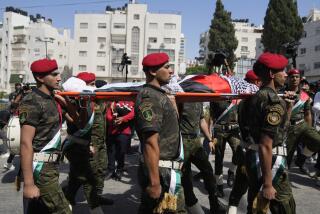Woman Becomes 9th to Die in South Korean Violence : Protests: She is apparently trampled. The new prime minister says he hopes to restore ‘confidence and trust’ in government.
SEOUL — The toll in South Korea’s monthlong protest rose to nine dead Saturday as a student was killed, apparently trampled as she and other protesters fled a barrage of virulent pepper gas in downtown Seoul.
She was identified as Kim Kwi Jung, 25, a junior at Sungkyunkwan University in Seoul.
Her death came as President Roh Tae Woo’s new prime minister, Chung Won Shik, 62, returned from a diplomatic mission in Africa and declared in an airport news conference that “stabilizing society and restoring confidence and trust between the government and the people is the task of foremost importance.”
Chung was named Friday to replace Ro Jai Bong, 54, who submitted his resignation after protests sparked by the fatal beating of a student by police April 26 expanded into unrest over rising inflation, incomplete democratic reforms and crackdowns on dissent.
Kim was killed in the midst of fierce fighting between police and about 8,000 demonstrators near the Sewoon Shopping Center about a mile from the city center. When police vans fired pepper gas in Gatling-gun fashion, a crowd fled in panic, trampling Kim, a French literature major, who had stumbled, according to the Seoul Broadcasting System, a private radio network. It quoted one of its reporters at the scene.
She was taken in a reporter’s car to Paek Hospital, where she was pronounced dead on arrival. Nearly 1,000 students took over the hospital’s parking lot and occupied the building to keep police out.
Chung, who as education minister in 1989 and 1990 banned the establishment of a teachers’ union and fired 1,500 teachers who joined it, told reporters at the airport that he is “aware of my reputation as a hard-liner.”
“I will correct it with actions, not words. I will take the label as advice not to be hard-line in the future,” he said.
The new prime minister, however, offered no apology for his actions as education minister.
“I don’t think I acted in an unfair manner,” he said, adding that he wants to be considered “a man of principle, who carries out business according to his conscience.”
“Now is the time for the government, political parties and every citizen to cooperate to calm the situation,” he said.
Chung had been dispatched by Roh to seek African support for South Korea’s planned bid for United Nations membership this fall.
As he spoke, riot police deployed throughout the capital dispersed crowds of protesters estimated at only slightly more than 10,000 at three locations--one of the smallest turnouts for a scheduled rally since the protests began. Police blocked off the main rally site, and fewer than 1,000 people showed up there. Protesters failed to get near the City Hall Plaza, their announced target.
Only in the area in which student Kim was killed did the number of protesters exceed 1,000.
Inclement weather--an on-and-off rainstorm and unusually cool temperatures--helped diminish the number of protesters. It was the first significant protest rally in Seoul in the last seven days.
In Kwangju, where sunny weather prevailed throughout the day, more than 100,000 turned out for commemorative rites for a student who set herself on fire to protest Roh’s government. Unlike their counterparts in Seoul, police in the southwestern provincial capital city of more than 800,000 permitted protesters to take the body to the city center for the rites.
The daytime protest was peaceful, but violence did break out late in the evening as about 5,000 students left the funeral procession and tried to attack the headquarters of Roh’s ruling party.
Other small protest rallies were reported in Pusan, Taegu and Taejon.
South Korea’s Roman Catholic prelate, Cardinal Stephen Kim, meanwhile, spoke out for the first time since the current political turmoil began. He asked police not to carry out threats to raid the grounds of the archdiocesan headquarters at Myongdong Cathedral, where a student wanted for questioning on suspicion of forging a suicide note for one of six persons who have died in self-immolations has taken refuge.
At the same time, the cardinal asked students and dissidents who moved the headquarters of their umbrella protest organization to the cathedral on May 18 to leave the grounds. A separate statement by the Catholic Church’s priesthood, however, criticized Roh.
“The government’s lukewarm steps in the wake of the death (of the student fatally beaten by police) and its hard-line stance against anti-government protests have caused all of us disappointment and concern,” the statement said.
In addition to Kim’s death Saturday, the six who died by setting themselves afire and the student who was beaten to death by police, a labor union leader died under mysterious circumstances while in police custody.
More to Read
Sign up for Essential California
The most important California stories and recommendations in your inbox every morning.
You may occasionally receive promotional content from the Los Angeles Times.










